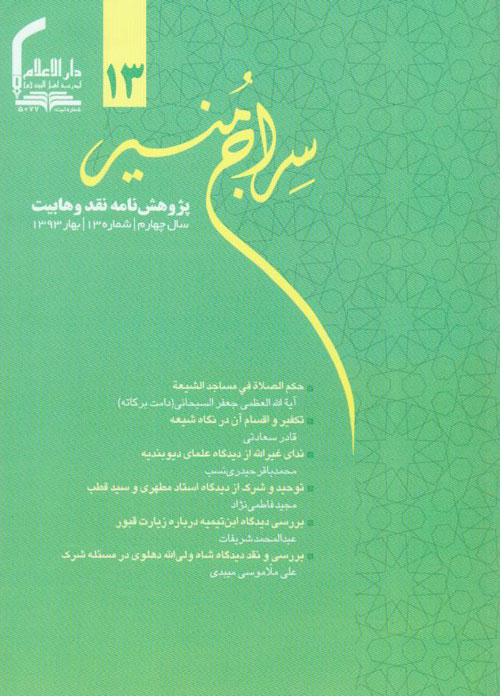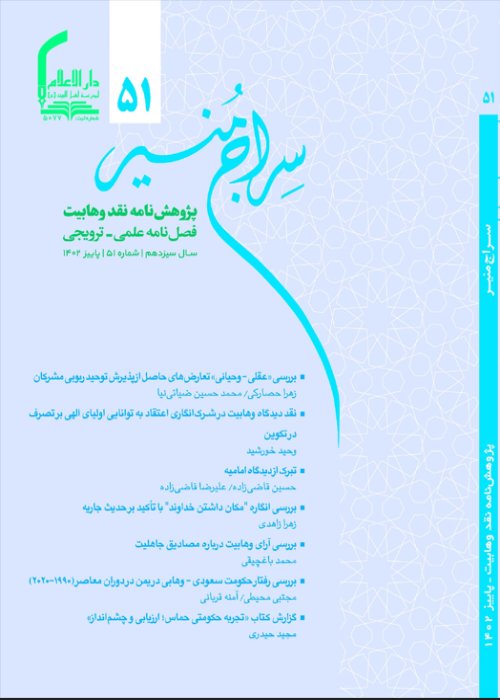فهرست مطالب

نشریه سراج منیر
سال چهارم شماره 13 (بهار 1393)
- تاریخ انتشار: 1393/03/25
- تعداد عناوین: 9
- سرمقاله
- گفتگو
-
سلفیه در دوران معاصر / در مصاحبه با استاد محمدجواد صاحبیصفحه 11
- مقالات
-
صفحه 29
-
صفحه 53در برخی روایات و کلمات فقهای شیعه مطالبی آمده که مشعر به کفر اهل سنت و مخالفان امامت ائمه(علیهم السلام) است، ولی با دقت در مضامین روایات و کلمات فقها درمی یابیم که منظور از کفر در این عبارات، خروج از اسلام نیست بلکه کفر در مقابل ایمان است و غیر از ناصبین و محاربین و معاندین، بقیه اهل سنت جزء مسلمانان هستند، ولی دارای ایمان نیستند و غیر از مستضعفان آنها، بقیه در آخرت دچار عذاب الاهی خواهند بود. در این حقیقت بین متقدمان و متاخران شیعه اختلافی نیست و اختلاف آنها در تعبیر است.
کلیدواژگان: کفر اهل سنت، تکفیر اهل سنت، شیعه، کفر، ایمان -
صفحه 77یکی از مسائل چالش برانگیز بین مسلمانان، توسل به اولیای الاهی و ندای به آنها بعد از وفات است. وهابیت و بعضی دیگر از مسلمانان این مسئله را شرک می دانند و برای اثبات مدعای خود از آیاتی که خطاب به بت پرستان زمان پیغمبر(ص) بوده است استفاده می کنند و معتقدند دون اللهی که خواندن آن شرک است عام است و شامل بت و پیامبر و اولیای الاهی بعد از وفاتشان می شود. در مقابل بعضی از علمای دیوبندیه این اطلاق را قبول ندارند و معتقدند هر ندایی موجب شرک نمی شود، بلکه ندایی شرک است که یکی از اسباب شرک در آن باشد و غالبا سه مسئله را از اسباب شرک می دانند: 1. حاضر و ناظر پنداشتن ارواح اولیا؛ 2. معتقد بودن به علم غیب اولیا؛ 3. استعانت از ارواح اولیا. در این مقاله، بعد از ذکر هر یک از سه مورد راه حلی که برای برون رفت از آنها بیان شده نیز اشاره شده است و در پایان دلایلی که علمای دیوبندیه بر جواز ندای غیرالله بیان کرده اند طرح می شود.
کلیدواژگان: ندای غیرالله، توسل، دیوبندیه، شرک، وهابیت -
صفحه 109مطهری و سید قطب در تعریف و اقسام توحید و شرک وجه نظر مشترکی دارند. گرچه سخنان سید قطب در این باره متشتت است، ولی از برخی کتب و نیز از تفسیر فی ظلال القرآن و بررسی آیات توحیدی آن می توان چنین استنباط کرد که وی توحید را از دو منظر عقیده و عمل بررسی کرده و توحید در عقیده را به دو قسم ذاتی و صفاتی، و توحید عملی را نیز به دو قسم فاعلی و عبادی تقسیم می کند. آنچه برای وی بسیار اهمیت دارد، توحید در حاکمیت است که پیونددهنده توحید عقیده به عمل است، بدین معنا که چون توحید الوهی است، باید حاکم نیز واحد باشد و اطاعت و بندگی هم فقط باید برای او باشد. لذا وی اطاعت از حاکم و طاغوت را نوعی شرک می پندارد. مطهری نیز اطاعت از طاغوت را نوعی شرک می داند، ولی معیار توحید و شرک را در توحید نظری «از اویی» و در توحید عملی «به سوی اویی» تفسیر می کند و اطاعت از حاکم را رابطه تسخیر طرفینی می داند و فقط شرک جلی را مستحق کفر می شمرد، برخلاف سید قطب که با استفاده از توحید در حاکمیت، عمل گرایی در اسلام را معیار مسلمان بودن فرد می داند. لذا اطاعت از حاکم و طاغوت را در زمره شرک جلی قرار می دهد و برای تمام آنها حکم کفر را مترتب می سازد.
کلیدواژگان: مرتضی مطهری، سید قطب، توحید، شرک، حاکمیت خداوند -
صفحه 131زیارت در لغت «تمایل و میل کردن» است و در اصطلاح مذهبی زیارت نوعی دیدار خاص (توام با اکرام) از بزرگان و پیشوایان دینی است؛ چه به حسب ظاهر در قید حیات باشند یا از دنیا رخت بر بسته باشند. ابن تیمیه تعریف درستی از زیارت قبور نداده و در تعریفش تشتت و تضاد دیده می شود. ظاهرا وی میان مفهوم زیارت و مصادیق آن و همچنین میان بدعت و ضلالت و شرک خلط کرده است. ابن تیمیه با شرعی و توقیفی دانستن زیارت، آن را منحصر در سلام کردن، دعا کردن برای میت و عبرت آموزی می داند. همچنین با تقسیم زیارت در عرف سلف و عرف متاخران، زیارت نوع دوم را که شامل درخواست دعا از میت، استغاثه، توسل و... می شود، بدعت، ضلالت و شرک بر می شمارد. وی قیودی به زیارت اضافه کرد که در نهایت اصل زیارت محل تردید واقع شد. مهم ترین دلیل ابن تیمیه در شرط و عدم شرط دانستن قصد سفر در سه مسجد (مسجدالحرام، مسجدالنبی و مسجدالاقصی) و دیگر اماکن، روایت «شد الرحال» است که بر فرض صحت سند دلالت آن اشکالات عمده ای دارد. عوامل مختلفی ابن تیمیه را به بیراهه کشیده است که در مقاله به آن اشاره خواهد شد.
کلیدواژگان: زیارت قبور، ابن تیمیه، وهابیت، بدعت -
صفحه 155شاه ولی الله دهلوی با تاثیرپذیری از آرای ابن تیمیه در مسئله توحید و شرک، و با ارائه تعریفی از شرک به مبارزه با مظاهر شرک در جامعه اسلامی زمان خود پرداخت. به عقیده او شرک، به شرک در عبادت، استعانت، ندا و استغاثه، نذر و قسم تقسیم میشود، او در آثار خود با تشبیه کردن عمل مشرکان زمان پیامبر با مسلمانان زمان خود، اعمالی مثل زیارت قبور، شد رحال، تسمیه به همراه «عبد»، توسل، استغاثه، و نذر و قسم را از مظاهر شرک شمرد و مسلمانان زمان خود را از این اعمال بر حذر داشت. در این مقاله می کوشیم آرا و اندیشه های محدث دهلوی را در حوزه شرک و اقسام آن بررسی کنیم.
کلیدواژگان: شاه ولی الله دهلوی، شرک، شد رحال، بناء بر قبور، توسل، شفاعت - گزارش ها
-
Page 77One of the controversial issues among Muslims is the issue of invocation to saints of Allah and imploring them for assistance after their demise. Wahhabites and some other Muslims consider this action as polytheism and to prove their claims they refer to those verses of the Holly Quran addressing the unbelievers in the time of the holy prophet. They believe that the phrase those apart from Allah in these verses which calling them is polytheism is a general concept. That includes idols, demised Prophet and saints of Allah. On the other hand, a number of the Duebandieh scholars do not agree with this generalization, they believe that not all sorts of calling and supplication lead to polytheism. Only those supplications that have certain features are considered a polytheistic act. They mostly mention the following features: 1. Believing that the spirit of the Allah’s saints are present and can see us, 2. Believing that they have the knowledge of the unseen, 3. Imploring their spirit for help. In the present writing after discussing these features, a solution has been given to solve the problem created by them. And in the end, the reasons stated by the Duebandieh scholars to give the permission to call someone apart from Allah are mentioned.Keywords: Calling out for someone apart from Allah, Duebandieh, Polytheism, Wahhabites
-
Page 109Motahari and Seyed Qutb share the same idea regarding the definition and classification of monotheism and polytheism. Although Qutb’s remarks on this issue are dispersed, analyzing some of his books and specially his interpretation of the verses of Holy Quran about monotheism and polytheism, in his book Tafsir Fi Zelal Al-Quran, we can infer that he has looked upon monotheism from two angles; belief and deed. In his idea monotheism in belief can be divided into unity of the Divine Essence and the unity of Divine Attributes. And monotheism in deeds can be divided into monotheism in worship and agent. One kind of monotheism that seems important for him is monotheism in ruling under which unity in belief and deeds are connected. In other words since unity is divine so the ruler must be one and obedience and devotion only belongs to him. Hence obeying any illegitimate ruler is considered a kind of polytheism. Motahari also believes that obeying any illegitimate ruler is polytheistic, but in his opinion the criterion in monotheism in belief is the fact that everything comes from him, on the other hand the criterion in monotheism in deeds is the fact that everything goes toward him. And obeying the ruler is mutual conquering relation. In Motahari idea only obvious polytheism deserves disbelief. On the contrary, with regard to monotheism in ruling, Seyed Qutb specifies human deeds as the criterion for being Muslim or infidel. And hence, he put obeying the illegitimate ruler as obvious polytheism and calls them all infidels.Keywords: Morteza Motahari, Seyed Qutb, monotheism, polytheism, ruling of Allah
-
Page 131The word Ziyarat means to have a desire for and in religious terminology means a special visitation out of respect to religious leader and elders no matter if these holy figures are alive or have passed away. Ibn Teymieh does not have a clear definition of Ziyarat. His definition is self contradictory. It seems that he has mixed up between the concepts such as Ziyarat and its meaning, heresy, misguidance and polytheism. He sees Ziyarat as something religiously predetermined and confines it only to greeting, praying for the departed and taking an example. According to the earlier and later scholars there are other parts to Ziyarat that he disagrees with. The scholars believe that Ziyarat can include asking for help from the departed, asking for pray and supplication etc. But he considers this kind of Ziyarat as heresy, misguidance and polytheism. He has set some limitation for Ziyarat that undermine the whole concept of it. The major evidence that he offers to consider the intention of traveling to three holy mosques of Al-Haram, Al-Nabi and Aqsa and other places as a condition or not is a narration known as Shado alrahal, roughly translated as fastening the provisions on the back of camel (getting ready to start a journey).Even if we can validate the chain of narration it will be difficult to accept this narration as a proof to his claim. Different factors that have misled Ibn Teymieh will be discussed in the present writing.Keywords: visitation (Ziyarat) of the tombs, Ibn Teymieh, Wahhabites, heresy
-
Page 155Being influenced by Ibn Teymieh’s opinions, Dehlavi presented a definition of polytheism and according to that definition started to fight against the so called manifestations of polytheism in his contemporary Islamic society. In his idea Polytheism is classified into polytheism in worshiping, asking for help, and calling out for assistance, vow and oath. By comparing the deeds of the unbelievers in the time of the Prophet Mohammad to those of the Muslims of his time in his works, he tried to specify actions such as visitation of the tombs, getting ready for travelling to holy places, uttering the names of the servants of Allah rather than His Name, supplication, imploring for assistance, vow and oath as manifestations of polytheism. Therefore, he warned the Muslims not to do any of these polytheistic deeds. In this present writing, the opinions and thoughts of this scholar of Tradition regarding polytheism and its different types are reviewed and criticized.Keywords: Shah Walioallah Dehavi, polytheism, Shado Al rahal (getting ready for travelling to holy places), erecting buildings on graves, supplication, intercession
-
Page 181There are some notions in Shia narrations and sayings of its jurisprudents that apparently convey the disbelief of the Sunnis and those against the imamate of the Imams. But in a more careful reading of these contents we can understand that disbelief in these contexts does not mean that the Sunnis are not Muslims; it is a concept contrary to faith. Except for the Nasebis, those who curse the Imams, Moharbeen, those who kill Shiites and Moanedeen, those who stand against and fight the Imams, the rest of the Sunnis are part of Muslims but they are not faithful ones and all but the oppressed ones will be punished on The Last Day. There is no disagreement among the early and later scholars regarding this understanding; there is only difference in naming and wording.Keywords: disbelief of the Sunnis, excommunication of the Sunnis, Shia, disbelief, faith


